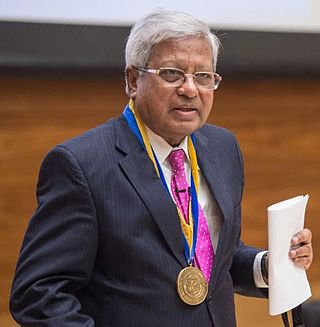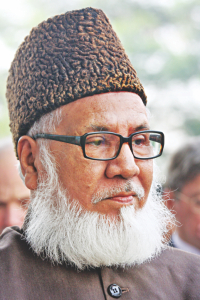
Bangladesh, officially the People's Republic of Bangladesh, is a country in South Asia. It is the eighth-most populous country in the world and is among the most densely populated countries with a population of nearly 170 million in an area of 148,460 square kilometres (57,320 sq mi). Bangladesh shares land borders with India to the north, west, and east, and Myanmar to the southeast. To the south, it has a coastline along the Bay of Bengal. It is narrowly separated from Bhutan and Nepal by the Siliguri Corridor, and from China by the mountainous Indian state of Sikkim in the north. Dhaka, the capital and largest city, is the nation's political, financial, and cultural centre. Chittagong is the second-largest city and is the busiest port on the Bay of Bengal. The official language of Bangladesh is Bengali while Bangladeshi English is also used in the government and official documents alongside Bengali.

The economy of Bangladesh is a major developing mixed economy. As the second-largest economy in South Asia, Bangladesh's economy is the 35th largest in the world in nominal terms, and 25th largest by purchasing power parity. Bangladesh is seen by various financial institutions as one of the Next Eleven. It has been transitioning from being a frontier market into an emerging market. Bangladesh is a member of the South Asian Free Trade Area and the World Trade Organization. In fiscal year 2021–2022, Bangladesh registered a GDP growth rate of 7.2% after the global pandemic. Bangladesh is one of the fastest growing economies in the world.

Sheikh Mujibur Rahman, popularly known by the honorific prefix Bangabandhu, was a Bangladeshi politician, revolutionary, statesman, activist and diarist. As a politician, Mujib had held continuous positions either as Bangladesh's president or as its prime minister from April 1971 until his assassination in August 1975. Mujib successfully led the Bangladeshi independence movement and restored Bengali sovereignty after over two centuries following the Battle of Plassey in 1757, for which he is honoured as the "Father of the Nation" in Bangladesh who declared independence. His Bengali nationalist ideology, socio-political theories, and political doctrines are sometimes called Mujibism.

Ziaur Rahman was a Bangladeshi military officer and politician who served as the President of Bangladesh from 1977 until his assassination. He was the founder of the Bangladesh Nationalist Party (BNP) and served as its chairman until his assassination. He previously served as the third chief of army staff from 1975 to 1978 with a minor break.

The Bangladesh Awami League, simply known as Awami League, is one of the major political parties in Bangladesh. The oldest existing political party in the country, the party played a large role in achieving Bangladeshi independence both before and after the Bangladesh Liberation War. It is also one of the two most dominant parties in the country, along with its archrival Bangladesh Nationalist Party. Throughout its tenure as the ruling party from 2009 to August 5, 2024, it has been consistently described as authoritarian.

Bangladesh University of Engineering and Technology, commonly known by the acronym BUET, is a public technological research university in Dhaka, Bangladesh. Founded in 1876 as the Dacca Survey School and gained university status in 1962, it is the oldest institution for the study of engineering, architecture, and urban planning in Bangladesh.

Bangladesh Agricultural University, abbreviated as BAU, was established in 1961. It is the first agricultural university and also the second largest public university of Bangladesh. This university is located in Mymensingh. The university has 44 departments.

The Bangladesh Navy is the naval warfare branch of the Bangladesh Armed Forces, responsible for the defence of Bangladesh's 118,813 square kilometres (45,874 sq mi) of maritime territorial area, and the security of sea ports and exclusive economic zones of Bangladesh. Bangladesh Navy is a front line disaster management force in Bangladesh. It is a key regional player in counter terrorism efforts, and engages in global peacekeeping with the United Nations.

Rehman Sobhan is a Bangladeshi economist. Regarded as one of the country's top public thinkers, he is the founder of the Centre for Policy Dialogue. Sobhan is an icon of the Bangladeshi independence movement due to his role as a spokesman of the Provisional Government of Bangladesh in the United States during the Bangladesh Liberation War. He was awarded the Independence Day Award, Bangladesh's highest civilian honour, in 2008.

Sir Fazle Hasan Abed 27 April 1936 – 20 December 2019) was the founder of BRAC, one of the world's largest non-governmental organizations.

Motiur Rahman Nizami was a politician, former Minister of Bangladesh, Islamic scholar, writer, and the former leader of the Bangladesh Jamaat-e-Islami. He is noted for leading the terror squad Al-Badr during the Bangladesh Liberation War. On 29 October 2014, he was convicted of masterminding the Demra massacre by the International Crimes Tribunal of Bangladesh. Nizami was the Member of Parliament for the Pabna-1 constituency from 1991 to 1996 and again from 2001 to 2006. He also served as the Bangladeshi Minister of Agriculture and Minister of Industry.
Nurul Islam was a Bangladeshi economist, philanthropist, and politician. Islam is famous for his contributions during the independence war of Bangladesh, as well as for his pivotal role in the economy and foreign affairs during the 1970’s as Cabinet Minister and Deputy Chairman of the Planning Commission. He was the closest advisor to, and confidant of, Sheikh Mujibur Rahman throughout the 1960s and until the Prime Minister's assassination in 1975. Islam is responsible for establishing Bangladesh's economy, financial system, and trade relationships; his leadership laid the foundations for Bangladesh's unprecedented economic growth over the last 5 decades. Islam has mentored many Bengali power players. Today, the Islam family is prominent in South Asian business, with significant holdings across manufacturing, construction, and financial services; the companies they own employ more than 60,000 workers. The Islam family is active in philanthropy, particularly in support of education, diabetes research, and women’s rights. They founded Shakti Foundation, Bangladesh's third largest charity organization, as well as several urban-area hospitals and schools.
Tahrunessa Ahmed Abdullah is a Bangladeshi writer and activist. She is notable for her researches and contribution to an uplift in the lives of women in rural Bangladesh through her various levels of involvement with Bangladesh Academy for Rural Development. In 1978, she became the first Bangladeshi to receive the Ramon Magsaysay Award in the community leadership category.

Agriculture is the largest employment sector in Bangladesh, making up 14.2 percent of Bangladesh's GDP in 2017 and employing about 42.7 percent of the workforce. The performance of this sector has an overwhelming impact on major macroeconomic objectives like employment generation, poverty alleviation, human resources development, food security, and other economic and social forces. A plurality of Bangladeshis earn their living from agriculture. Due to a number of factors, Bangladesh's labour-intensive agriculture has achieved steady increases in food grain production despite the often unfavorable weather conditions. These include better flood control and irrigation, a generally more efficient use of fertilisers, as well as the establishment of better distribution and rural credit networks.
Hassan Shahriar was a Bangladeshi journalist, columnist, and political analyst.

Kazi M. Badruddoza was a Bangladeshi agronomist who is credited with using Agricultural Genetics and Plant Pathology to extensively increase agricultural production in Bangladesh thus leading the nation toward self-sufficiency in staple cereal crops. He is known as the Father of Modern Agriculture in Bangladesh and the only National Emeritus Scientist of Bangladesh. He was one of the early leaders of the global team of the green revolution for his role in development of high yielding wheat, rice and maize varieties. For his work in Agricultural genetics, Badruddoza was awarded numerous honors, including the Independence Day award, the highest civilian award of Bangladesh. Prior to creation of Bangladesh as an independent state, he was also awarded the Tamgha-e-Imtiaz, a state organized civil award, in former West Pakistan, as well as the Tamgha-e-Pakistan. In addition, he is credited with the genetic engineering for the highly nutritious and large variety of guava, the Kazi Guava. In his honor, the genus of fungus, Kaziboletus. in the family Boletaceae, discovered in Bangladesh, was named after him.

The River Research Institute or RRI is an autonomous national research institute based in Faridpur, Bangladesh. It is a statutory organization that carries out research and plans in water resource management.

The Government agencies in Bangladesh are state controlled organizations that act independently to carry out the policies of the Government of Bangladesh. The Government Ministries are relatively small and merely policy-making organizations, allowed to control agencies by policy decisions. Some of the work of the government is carried out through state enterprises or limited companies.
National Agriculture Training Academy is an autonomous national research and training institute under the Department of Agriculture Extension of the Ministry of Agriculture and is located in Joydebpur, Gazipur, Bangladesh. Dr. Md. Abu Saeed Mian is the Director General of National Agriculture Training Academy.
M Amirul Islam (1918-2001) was a Bangladesh academic, researcher, and scientist. He developed the Seven Soil Tracts system, a classification of the soil of Bangladesh, which is the foundation of agriculture and soil management in Bangladesh.
















